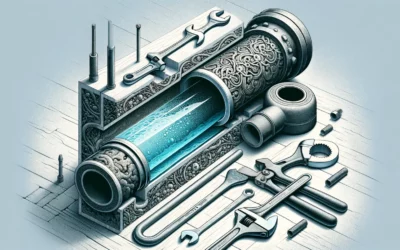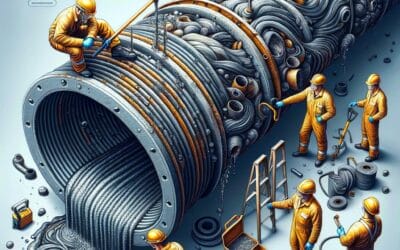Welcome to our latest post – “Expert Plumbing Insights: Unraveling the Mystery of Sewage Smell at Home”. This piece is brimming with fact-based advice and insights from seasoned plumbing experts that will help you understand, identify, and ultimately solve the pesky issue of unusual sewage odors in your home. Reading this post will not only equip you with the knowledge to tackle this common problem but will also save you time, money, and unnecessary stress. We break down complex plumbing information into easy, digestible content, with practical tips and preventative measures. After reading, you will have taken a big step on the path to maintaining a fresh and inviting home environment. You can consider this entry an essential part of your homeowner’s toolbox. So, let’s delve in and together, demystify the menace of sewage smell.
Understanding the Causes of Sewage Smell at Home: An Introduction
Dealing with a persistent smell of sewage in your home can be both unpleasant and frustrating. The problem is much more than just an inconvenience; it’s often a symptom of a more serious plumbing issue that could be placing your home structure and your family’s health at risk. Even if the smell is faint or intermittent, it’s something you shouldn’t ignore.
To gain a good grasp of this issue, one must start from understanding the common causes of sewage smell at home. Let’s take a closer look at them:
- Cracked sewer pipes: Over time, your house’s sewer pipes may crack or become damaged. This can allow sewage smells to seep into your home.
- P-Traps: If a sink, shower, or tub is rarely used, the water that usually fills a U-shaped pipe called a P-trap can evaporate, allowing sewage smells to leak out.
- Loose toilet base seals: If the seal around your toilet is loose, sewer gas can escape.
| Common Cause | Typical Presence |
|---|---|
| Cracked sewer pipes | Constant, strong smell |
| P-Traps | Smell only in seldom used areas |
| Loose toilet base seals | Smell only in a bathroom |
Dealing with sewage smell at home can be as simple as refilling a P-trap with water or as advanced as replacing cracked sewer pipes. No matter the cause, your best bet is to address the issue as soon as you detect the foul odor, to prevent any potential structural or health hazards from escalating.

Delving Deeper: The Role of Plumbing System in Preventing Sewage Odor
When you’re left wondering about that unpleasant sewage odor creeping up from your drainpipes, remember that a well-designed and properly maintained plumbing system plays a pivotal role in preventing such issues. The core function of the plumbing system is to ensure that waste and wastewater from your home are safely transported away. The plumbing system employs a series of pipes, traps, and vents to accomplish this while simultaneously preventing the unpleasant smell of sewage from infiltrating your home.
First, the pipes in your plumbing system are used for waste transportation, carrying wastewater from your home to the local sewage system or septic tank. Traps, the U-shaped bends in the drainpipe, play a significant role. They retain a small amount of water after each use, acting as a barrier that prevents sewage gases from backing up into your house. However, their effectiveness relies on regular use of the fixture. When it remains unused for long periods, the trap can dry out, breaching the barrier. Vents are also critical components of your plumbing system. They help to maintain proper atmospheric pressure in your drainpipes and vent sewer gases out above your roof, thus, minimizing the chances of these gases penetrating your living space.
| Plumbing Component | Role |
| Pipes | Transport waste and wastewater away from your home |
| Traps | Prevent sewage gases from invading your home by storing water that acts as a barrier |
| Vents | Maintain atmospheric pressure in drainpipes and vent sewer gases outside |
Therefore, consistent maintenance of these components is of utmost importance and should not be overlooked. Regular checkups and proper care will ensure the plumbing system operates smoothly and effectively, keeping the nasty smells at bay, providing you with a fresher and more enjoyable home environment.
Cracking the Mystery: Identification and Detection of Sewage Smell Triggers
The aroma of your house offers a crucial glimpse into the state of your domestic well-being – whether or not its occupants are living comfortably. When the whiffs of musty, dingy sewer smells begin to permeate your homely serenity, it’s high time to identify and understand the underlying triggers. The most common causes for these untoward smells can usually be traced back to the following major culprits:
- Trapped Sewer Gas : Frequently, the pungent odor is indicative of trapped sewer gas escaping through various outlets.
- Blocked or Dry Drains : Clogged or stagnated drains are breeding grounds for bacteria which releases unpleasant odors over time.
- Cracks in Sewer Lines : Cracks can form in your sewer lines over time, providing an escape route for stray sewage smells.
- Septic Tank Issues : Finally, problems with your septic tank or its maintenance can also result in sewage stench wafting through your home.
Once the broad causative factors have been identified, we must take strides in detection and troubleshooting of the specific issues at hand. To eradicate the offending smells, you ought to inspect these critical points in your household plumbing:
| Area of Inspection | Possible Issue |
|---|---|
| Sink and Bathroom Drains | Buildup of Organic Matter |
| Toilet Seals | Loose or Faulty Seals |
| Vent Pipes | Blockages |
| Sewer Lines | Cracks or Clogs |
Remember: it is always wise to call in a professional plumber if the issues persist. Not only can they effectively pinpoint and fix the problem, but they could also detect any more severe, underlying issues that might be causing the pervasive sewage smell.

In the Expert’s Shoes: Methods to Effectively Address Sewage Smell
If you’re constantly dealing with a pesky sewage smell at home, you’re in the right place to find solutions. As experts in the field of plumbing, we’ve been through it all and we’re here to share some effective methods to address this issue. To make a significant difference, the two main action steps involve locating the source of the smell and implementing remedial measures.
Playing the detective role, start by identifying where the smell is coming from. Bathroom and kitchen sinks are often the culprits, but it could also be your washing machine, shower drain, or toilets. Once you’ve found the source, use the table below to figure out possible causes and their solutions:
| Source | Possible Cause | Solution |
|---|---|---|
| Bathroom/Kitchen Sink | Empty P-trap | Run water to refill trap |
| Shower Drain | Clogged Drain | Use a plunger or plumber’s snake |
| Washing Machine | Poor Ventilation | Check and replace faulty vents |
The remedial measures could range from simple strategies like refilling your P-trap with water to prevent sewer gas from wafting into your home or more complex solutions like checking, repairing, or even replacing your plumbing vents. However, in severe cases, it might be necessary to call a professional plumber.
It’s important to swiftly locate and address the source of the sewage smell as it’s not only unpleasant but could potentially pose health risks to your family. Remember, you don’t have to live with a nasty sewage smell at home. With a little bit of effort and our expert strategies, you can restore your living space to its fresh, welcoming state.
Homeowner Handbook: Effective Maintenance Tips to Prevent Sewage Smell
Let’s start with what causes unpleasant sewage smell in your home. One of the prime culprits is often dried out water seals. Your plumbing system is designed to contain a small amount of water in the drains as a seal against sewer gases. This water can dry out in sinks, toilets, or drains that aren’t frequently used. If this is the case, simply running water through these fixtures can easily solve the problem.
Other possible causes include broken or leaky pipes, blocked vents, or a damaged sewer line. If you’ve addressed the possibility of dry seals and the smell persists, you may need to call in a professional plumber. These issues can be complex and a professional will have the right tools and expertise to diagnose and solve the problem.
- Dry Water Seals: Regularly run water in rarely used sinks and toilets.
- Leaky Pipes: Regularly inspect your pipes for any leaks and repair them immediately.
- Blocked Vents: Regularly check your vents to ensure they are clear. Call a professional if they are blocked.
- Broken Sewer Line: In case of strong persistent smell, call a professional as your sewer line might be damaged.
The following table provides a summary of the common causes and solutions for a sewage smell at home:
| Problem | Solution |
| Dry Water Seals | Run water regularly |
| Leaky Pipes | Inspect and repair pipes regularly |
| Blocked Vents | Check vents and call a professional if blocked |
| Broken Sewer Line | Call a professional |
Maintaining a clean and odor-free home isn’t merely about comfort—it’s also crucial for your health. Keep the elemental part of your home functioning accurately by following these expert plumbing insights and avoid the distressing encounter with sewage smell at home.
Empowering Homeowners: Implementing Professional Advice to Combat Sewage Smell at Home
Imagine coming home from a tiring day at work, only to be greeted by a foul, sewage-like smell wafting around your living quarters. Although unsettling, these smells are often a result of faulty plumbing or issues with the sewage system. By implementing professional advice, you can identify and rectify these issues on time.
Identifying the Cause
Before you can engage in any form of solution, it’s crucial to understand the root cause of the smell. Most commonly, this odor is due to:
- Dry P-traps: These u-shaped pipes under your sinks and drains are designed to contain water, creating a barrier against sewage gas. If a p-trap is dry, it can’t prevent the gas from entering your home.
- Sewer line blockages: If your main sewer line is blocked, the pipes can become pressurized, forcing sewer gas into your home through any available exit.
Keep an eye on indicators that might signal a problem with your sewage or plumbing systems. Are there gurgling noises coming from your drains? Has the water pressure dropped suddenly? These could be red flags.
Solving the Issue
Thankfully, professional advice can lead us to simple, effective solutions. Here’s how:
- If dry P-traps are the issue, the solution is as simple as running water through your sinks, tubs, and showers regularly, especially if you don’t use them often. This helps keep the P-traps filled.
- If a blockage is causing the problem, a professional plumbing service should assess and fix it. Plumbing problems should be tackled promptly to prevent further damage.
Remember, professional advice is your strongest tool in combating unwanted sewage smells. Taking swift action could save you from costly and potentially dangerous predicaments in the future.
Key Takeaways
In closing, it’s crucial to understand that the disturbing scent of sewage in your home should never be sidelined. As we’ve discussed throughout the article, myriad issues may trigger such smells, from simple to complicated ones. The key lies in not just identifying these issues but more importantly, addressing them promptly to safeguard your home and the heath of everyone in it. Remember, your plumbing system isn’t a mystery that you have to solve alone; expert plumbers are only a call away. They have the requisite knowledge and tools to unmask and fix these issues in no time. Neglecting sewage smells might lead to bigger, expensive problems down the line. So, never hesitate to consult a professional about your concerns—timely attention will save both your nose and your wallet. Here’s hoping this article has provided you with useful insights into understanding and tackling the unwelcome mystery of sewage smells at home. Stay informed, stay safe!









